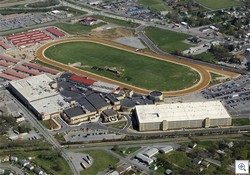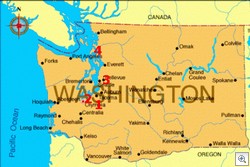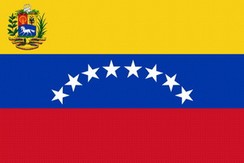Archive for November, 2010
 West Virginia launched a state lottery in 1986. By that date, horse-race wagering was firmly in place, having won legislative authorization in 1933. Charitable bingo games were also popular. The appearance of the lottery gave the tracks of the state a hook with which they sought to win the right to have machine gambling, and they were successful. West Virginia launched a state lottery in 1986. By that date, horse-race wagering was firmly in place, having won legislative authorization in 1933. Charitable bingo games were also popular. The appearance of the lottery gave the tracks of the state a hook with which they sought to win the right to have machine gambling, and they were successful.
The West Virginia legislature authorized an experimental installation of video gaming machines – keno machines, poker machines and machines with symbols – at Mountaineer horse-racing track beginning on 9 June 1990. At first, only seventy machines were installed. During the experimental time the number grew to 400 in 1994, most of them being keno machines. The first machines had payouts of 88.6 percent. During a three-year experimental period the lottery agreed not to put machines in other locations. Now machines are at the three other tracks as well. The track keeps 70 percent of the revenues, and 30 percent goes to the state.
The machines were operated by the state lottery. Lottery director Butch Bryan said, “We developed VLTs [video lottery terminals] to save our horse racing industry. We think it is doing what we designed it for. It has been very beneficial to the horse track. It may not cure their problems in the long run, but it will certainly prolong their life. We believe the entertainment aspect of VLTs is good for the horse racing industry” (LaFleur 1992, 65). In 1993, Bryan was convicted of insider trading, bid rigging, and lying to a grand jury in the state’s purchase of the machines. According to a news story in International Gaming and Wagering Business November-December 1993, he owned stock in the major company that won the supply contract.
 The state of Washington has had legalized gambling for most of a century. Pari-mutuel horse-race betting was established with the opening of the Longacres course in 1933. The state now has five tracks. The Longacres facility was purchased by Boeing Aircraft Company for plant use. The state of Washington has had legalized gambling for most of a century. Pari-mutuel horse-race betting was established with the opening of the Longacres course in 1933. The state now has five tracks. The Longacres facility was purchased by Boeing Aircraft Company for plant use.
The state also has a government-operated lottery under control of the Washington State Lottery Commission. The lottery was authorized in 1982. The state’s most popular games are instant tickets. It also offers lotto and daily numbers games. Additionally, gambling games may be conducted by charities, by amusement centers for children, and by commercial establishments in the form of casino table games; pull tabs, including video pull-tab machines; and punch boards. The machines, which may also include a daily keno game, are under the supervision of the lottery.
There are sixteen Native American casinos operating under state-negotiated compacts, pursuant to the Indian Gaming Regulatory Act. Table games have been authorized through compacts; however, machines have not been, although the tribes utilize machines that appear to be slot machines anyway, and they have operated them while the state was unsuccessful in winning federal support to stop their play.
In 1996, the voters of the state were asked to approve slot machines for the tribes. Only 44 percent were in favor of the machines. The state also authorizes instant video ticket machines (IVTMs) to dispense instant lottery tickets (scratch-off tickets) directly to a buying public that inserts currency into the machine for tickets. These machines can be placed in any location in the state and dispense tickets twenty-four hours a day, 365 days a year.
Bingo games are conducted for charities and at Native American facilities as live games. Bingo is also conducted through satellite operations connecting Native American casinos in Washington to ones in other states. Additionally, bingo is conducted through electronic machines.
Washington authorized commercial public card rooms in 1976. Initially, the games were basically player-banked games – poker and blackjack in which the deal rotated among players – until the legislature approved house-banked card games in 1997. The commission first approved a two-year test project, which allowed these commercial card rooms to essentially be full-scale casinos. They were allowed to have fifteen table games. The commercial minicasinos also could have banks of state-owned pull-tab machines and large boxes of pull tabs for sale. There was no limit on the number of machines. During the first six months of the test, the minicasinos had twenty-five-dollar limits per play; however, afterward the limits were raised to $100 for each play. The pilot project for having commercial (mini) casinos was ended in March 2000. The state deemed it a success, or so it must have done, for the project was made permanent. There are now approximately sixty such casinos. I toured casinos as a consultant for the Colville tribe in April 2000.
These minicasinos are not small facilities, as they offer players up to fifteen live casino games that operate almost identically to the casino table games found in Las Vegas. They certainly have the form and appearance of table games in Las Vegas. Considering the world of gambling, it may be suggested that fifteen tables represent not a minicasino, but rather an average-sized casino. Off the Las Vegas Strip, fifteen tables would be considered average or even a large casino facility. The minicasinos call themselves casinos.
Revenues from legalized gambling in Washington are substantial. In 1997, players gambled over $1.5 billion in legal facilities in the state, in non-Native American facilities. The players lost over $460 million of this amount. The addition of commercial minicasinos and expanded compacted Native American casinos and machine gaming makes the amount of gambling money much higher today—probably well over double the amount.
The Wagering Paraphernalia Act of 1961 was part of Atty. Gen. Robert F. Kennedy’s crime-fighting legislation package. The act authorized fines up to $10,000 and prison sentences up to five years for any person who “knowingly carries or sends” in any interstate commerce any information that is conveyed as writing, paper, token, slip, bills, certificates, tickets, record, paraphernalia, or “devices used” for the purpose of “bookmaking”, “wagering pools with respect to a sporting event”, or lotteries and numbers games. The law did not apply where the wagers were legal in the state to which they were sent.
The purpose of the act seemed to be to cut off supplies to illegal gamers, especially those in numbers games and illegal lotteries that were dependent upon paper products. The act did not apply to materials carried by common carriers as a normal part of their business, to pari-mutuel materials sent to tracks where wagering was legal, to newspaper publications, or to materials used in legal lotteries.
In 1993, the penalty provisions were amended to authorize fines from $3,000 to $30,000, with maximum prison time remaining at five years.
Virginia established a lottery in 1988 after many false starts over the previous fifteen years. Fifty-six percent of the voters supported the lottery proposition. Virginia participates in the multistate Big Game lotto, as well as selling its own lotto tickets, numbers games, and instant tickets. The revenues of the lottery are earmarked for educational purposes. Charitable gaming is also permitted, and there are facilities for offtrack race betting. There is no casino gambling, as the state has successfully fought off efforts of ocean cruise ships to dock at ports in the state.
Although Virginia has come to gambling authorizations only recently in the modern era, the state certainly has had a history of gambling. Within the first five years of its existence as an English colony, Virginia became the beneficiary of a lottery authorized by King James. In 1620, twenty mares were shipped from England to Virginia Colony, and horse racing with private wagering became a regular activity for the settlers. In later colonial days, lotteries were prevalent. George Washington and Thomas Jefferson participated in most forms of gambling – they played cards, raced horses, and were involved in lotteries. Jefferson conducted a lottery in 1826 in an effort to dispense of his property so that he could pay all his debts prior to his death. Unfortunately, he died before this result could be realized.
The Virgin Islands lie off the eastern edge of Puerto Rico. The islands are controlled by the governments of the United States and Great Britain. The U.S. Virgin Islands (USVI) consist of fifty small islands. The most populated of the USVI are St. Croix, St. Thomas, and St. John. Together the USVI have just over 100,000 residents. In 1989, Hurricane Hugo devastated the tourist islands. Many properties were destroyed, as was much of the islands infrastructure. A depression ensued during which many of the air flights to the islands ceased. In 1995 the two leading employers – Hess Oil and Virgin Island Alumina – cut production and downsized by 650 employees. Casino gambling, an idea that had been rejected several times before, suddenly became popular. A referendum was authorized, and the voters endorsed casinos by a narrow margin. On 3 November 1995, the Virgin Islands’ representative assembly followed the popular will by passing legislation authorizing casino licenses. The law was amended on 6 March 1997.
The legislation provides for up to six casinos in hotels on St. Croix island. The first of the six opened in 2000 at the Divi Carina Bay Resort. The resort now has only 126 rooms, twenty villas, and a convention center. The licenses are issued by a board of commissioners appointed by the governor. Of the six licenses, one must go to a company that is obligated to build a 1,500-room hotel and have a gaming area of 20,000 square feet or more in the facility, along with convention and banquet facilities. Two licenses go to hotels with at least 300 rooms and a casino of 10,000 square feet or more, while another two go to hotels of at least 200 rooms located in two historic districts of the island. A smaller casino may be licensed in another hotel with at least 150 rooms. The Divi Carina barely qualifies. Licensing fees are related to the size of the casino. The taxation formula for the casinos is an 8% win tax for their first two years, then 10% for the next two years, and 12% thereafter. The taxation formula was derived from the laws of New Jersey. As in New Jersey, the casinos must also make investments of 1.25% of their gross revenues in development projects on the island. The casinos are also subject to the U.S. cash transaction reporting rules and the reporting rules of the Internal Revenue Service.
Many of the details of the New Jersey gaming law were incorporated into the legislation, as the lawmakers felt that the “strict” regulatory model of New Jersey would best suit the Virgin Islands’ needs for high integrity. The needs may indeed have been met in their entirety. No one can challenge the integrity of casino gaming in the Virgin Islands.
Vermont ranks forty-sixth in gambling revenues among the forty-seven states that have some form of legalized gambling. Only Alaska has less gambling. Vermont created a state lottery in 1978. Of the thirty-eight lottery jurisdictions in the United States (thirty-seven states plus the District of Columbia), only Montana sells fewer tickets. Although Vermont is a very small state, it has not joined the Powerball multistate lottery that was designed so that small states could generate sales through offering large jackpot prizes. Previously, the state joined with New Hampshire and Maine in the Tri-State lotto game.
Although horse-race betting is permitted at Vermont tracks, there were no such tracks as the state entered the twenty-first century. There is a short dog-racing season at the Green Mountain racetrack.
The closest the state has come to considering casino gambling has been the effort of the Abeniki Native Americans to have lands in the state declared to be reservation lands. It is assumed that if they ever get federal recognition, they will seek also to gain a compact for gambling.
 Some gambling activity is quite legal in Venezuela, but other activity operates on the edge of the law. Bingo parlors, horse and dog racing, and government lotteries are authorized; however, casinos are in some sort of limbo. In recent years, many casinos have operated on Margarita Island – a tourist resort area – and other locations under authorizations from local governments. The country of 15 million avoided resolving many regulatory issues, however, as there was no national law on casinos. Finally in 1996 a national law was passed. National authorities sought to preempt all local authorization of casino gaming. Under the law, casinos were permitted in five-star hotels with 200 rooms if they were located in tourist zones. Margarita Island was one such zone. The casinos were to be given ten-year renewable licenses. They were taxed at a rate of 20% of their gross gaming wins. Most of the casinos closed because they could not meet requirements for licensing, and only one received a license. That casino, the Grand Casino Margarita, is located in the Margarita Hilton Hotel. It is run by CIRSA, a Spanish gaming company. The government has approved eight other zones for casinos, but no licenses are pending. Some gambling activity is quite legal in Venezuela, but other activity operates on the edge of the law. Bingo parlors, horse and dog racing, and government lotteries are authorized; however, casinos are in some sort of limbo. In recent years, many casinos have operated on Margarita Island – a tourist resort area – and other locations under authorizations from local governments. The country of 15 million avoided resolving many regulatory issues, however, as there was no national law on casinos. Finally in 1996 a national law was passed. National authorities sought to preempt all local authorization of casino gaming. Under the law, casinos were permitted in five-star hotels with 200 rooms if they were located in tourist zones. Margarita Island was one such zone. The casinos were to be given ten-year renewable licenses. They were taxed at a rate of 20% of their gross gaming wins. Most of the casinos closed because they could not meet requirements for licensing, and only one received a license. That casino, the Grand Casino Margarita, is located in the Margarita Hilton Hotel. It is run by CIRSA, a Spanish gaming company. The government has approved eight other zones for casinos, but no licenses are pending.
|
 West Virginia launched a state lottery in 1986. By that date, horse-race wagering was firmly in place, having won legislative authorization in 1933. Charitable bingo games were also popular. The appearance of the lottery gave the tracks of the state a hook with which they sought to win the right to have machine gambling, and they were successful.
West Virginia launched a state lottery in 1986. By that date, horse-race wagering was firmly in place, having won legislative authorization in 1933. Charitable bingo games were also popular. The appearance of the lottery gave the tracks of the state a hook with which they sought to win the right to have machine gambling, and they were successful.
 Some gambling activity is quite legal in Venezuela, but other activity operates on the edge of the law. Bingo parlors, horse and dog racing, and government lotteries are authorized; however, casinos are in some sort of limbo. In recent years, many casinos have operated on Margarita Island – a tourist resort area – and other locations under authorizations from local governments. The country of 15 million avoided resolving many regulatory issues, however, as there was no national law on casinos. Finally in 1996 a national law was passed. National authorities sought to preempt all local authorization of casino gaming. Under the law, casinos were permitted in five-star hotels with 200 rooms if they were located in tourist zones. Margarita Island was one such zone. The casinos were to be given ten-year renewable licenses. They were taxed at a rate of 20% of their gross gaming wins. Most of the casinos closed because they could not meet requirements for licensing, and only one received a license. That casino, the Grand Casino Margarita, is located in the Margarita Hilton Hotel. It is run by CIRSA, a Spanish gaming company. The government has approved eight other zones for casinos, but no licenses are pending.
Some gambling activity is quite legal in Venezuela, but other activity operates on the edge of the law. Bingo parlors, horse and dog racing, and government lotteries are authorized; however, casinos are in some sort of limbo. In recent years, many casinos have operated on Margarita Island – a tourist resort area – and other locations under authorizations from local governments. The country of 15 million avoided resolving many regulatory issues, however, as there was no national law on casinos. Finally in 1996 a national law was passed. National authorities sought to preempt all local authorization of casino gaming. Under the law, casinos were permitted in five-star hotels with 200 rooms if they were located in tourist zones. Margarita Island was one such zone. The casinos were to be given ten-year renewable licenses. They were taxed at a rate of 20% of their gross gaming wins. Most of the casinos closed because they could not meet requirements for licensing, and only one received a license. That casino, the Grand Casino Margarita, is located in the Margarita Hilton Hotel. It is run by CIRSA, a Spanish gaming company. The government has approved eight other zones for casinos, but no licenses are pending.